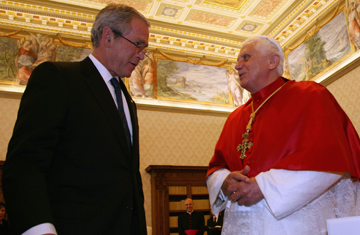
VATICAN CITY - Pope Benedict XVI meets US President George W. Bush at the Vatican June 9, 2007 in Vatican City.
At first glance, President Bush and Pope Benedict XVI offer a portrait in contrast: the swagger of a trust-my-gut Texan and the shyness of a cerebral theologian. But behind the photo-op set at Saturday's first-ever Bush-Benedict meeting were two men with some key traits in common. Both, of course, wield their words and policy with planetary reach thanks to the unique offices they hold. But there are also some notable parallels in the way they have come to exercise their respective global roles. More than six years into Bush's Presidency and two years into Benedict's papacy, it is clear that neither is cut from the traditional cloth of international diplomacy. Beyond what are indeed very different styles and backgrounds and job descriptions are leaders who pride themselves as straight talkers who act according to what they see as simple truths. Indeed, the head of the Roman Catholic Church and the born-again Protestant President acknowledge that their public deeds — and diplomacy, itself — are driven by a very palpable and personal religious faith.
404 Not Found
U.S. policy in Iraq is the "error" that sticks foremost in minds throughout the Church hierarchy, going back to Pope John Paul II's firm opposition to the original invasion in 2003. By all accounts, Benedict was in lockstep with his then boss in opposing the war, and has recently commented that there is "nothing positive" coming out of the situation in Iraq. Of particular concern in Rome is the destiny of the Christian minority in the country. Over the past week, a Catholic Chaldean priest and three deacons were killed in Mosul in northern Iraq, while another Chaldean priest and five parishioners have been abducted in Baghdad. Thousands of Christians are fleeing the war-ravaged country. However, for fear of risking a further deterioration of the situation facing Iraqi ethnic and religious minorities, few clerics are calling for immediate withdrawal of U.S. troops. Indeed, the official Vatican position is to support the Iraqi government. Nevertheless, the Vatican's official communique after the meeting with the American President cited the "worrying situation in Iraq." The Pope also raised another Mideast issue: the Palestinian-Israeli conflict, where many in the Vatican privately criticize the U.S. for not taking a more active role in mediating the divide.
The Vatican finds common ground with the Bush Administration on bioethical questions. Vatican Secretary of State Cardinal Tarcisio Bertone recently praised the White House on its anti-abortion stance: "The United States is a great country, and the current President has especially distinguished himself for some positive initiatives in favor of the defense of life from conception," Bertone told the newspaper Avvenire.
Of course, truth, even that which is believed to come from above, does not preclude the need for diplomacy. Private audiences with the Pope, such as the one with Bush, tend to be largely symbolic and often formal affairs, compared with the ongoing substantive talks and collaboration among the full-time diplomats. The meeting itself was an opportunity for Bush to remind America's Catholic voters of their "shared values" with the Pope: from opposition to stem-cell research to anti-poverty efforts in Africa. After meeting the Pope, Bush sat down with the Catholic aid group Communita di Sant'Egidio, which has been among the best unofficial arms of Vatican diplomacy, and encompasses the idea of faith-based initiatives so dear to the American President.
The Bush-Benedict meeting offered a cordial public face to relations between the Holy See and the U.S. But it often takes weeks and months to unpack what has happened in the closed-door talks. One possible topic of discussion is bound to stay secret: a papal trip to the U.S.
